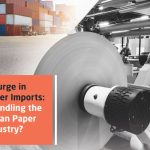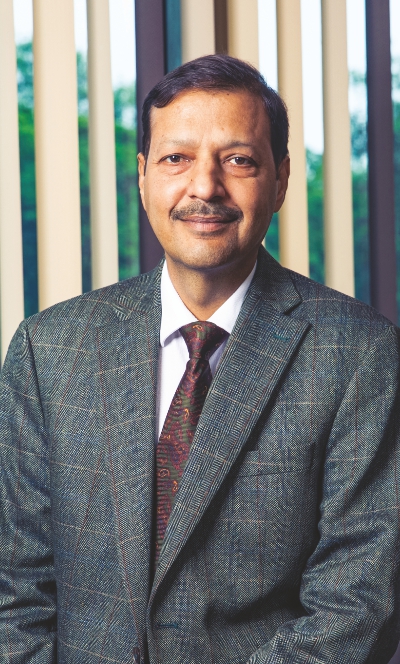
Kuantum Papers Limited has a Pan-India presence and is amongst the pioneering Indian paper manufacturers. The company is focusing on diversifying its existing portfolio of writing and printing segment by developing more specialty paper products and sustainable packaging. The company is also among the forerunners supporting the single-use plastic ban and the eventual replacement of plastic products in India. In a recent conversation with Paper Mart, Mr. Pavan Khaitan, Vice Chairman & Managing Director of Kuantum Papers Limited, spoke about the company’s exemplary FY 22-23 performance and shared his insights on new developments, R&D initiatives, the robust distribution network, raw material procurement channels, and vision going forward. Kuantum Papers is planning a 25 percent capacity addition by upgrading the existing machines and is looking to set up a new specialty paper machine. The company is also working on a tripartite collaboration for bio-barrier technology
integrated into paper products.
Paper Mart: Kuantum Papers’ FY22-23 performance has been great. Please share the key figures that you have achieved in the FY and the major contributing factors behind your overall performance.
Pavan Khaitan: Kuantum Papers’ financial performance in FY22-23 was phenomenal, with us achieving newer milestones. We hit a benchmark revenue of INR 1,313 crores with an EBITDA of almost 30 percent. FY22-23 proved a wonderful year for the paper industry as a whole, wherein post-Covid-19, the industry saw a lot of demand from the market leading to all-time-high Net Sale Revenues (NSRs). Apart from positive industrial economics, many corporate-level factors also contributed to our success.
At Kuantum, we made a lot of changes fundamentally towards cost optimization as part of the backward integration project which we completed in March of 2021 which have yielded results during FY22-23. These included setting up the wood pulp mill to replace imported pulp with indigenous pulp, adding on a Chemical Recovery Plant which recovers over 95 percent of caustic soda, and removing dependency on grid power by adding capacity to our own Co-Gen Power Plant.
The cumulative effect of the increased NSR, cost and operational efficiency, and improved product mix was that our EBITDA percentage reached almost 30 percent, whereas pre-Covid it had never gone beyond 18 percent.
Watch: JMC Paper Tech Launches New Subsidiary JMC Papers
PM: Single-use plastic ban has created various opportunities for the paper industry. How are Kuantum Papers making the most of this opportunity?
PK: Single-use plastic ban by the Government of India was a very welcome step to reduce plastic waste, especially, high-littering single-use plastic which has always proposed a challenge in terms of disposal as a lot of it ends up either in landfills or remains un-recycled and finds its way as microplastics in the ocean. Fortunately, the paper industry was very quick to respond with product innovations and supported this ban. We saw a huge demand for paper straws, cup stock, and paper bags which are also manufactured by Kuantum.
Going forward, plastic-replacement policies are a huge opportunity for the industry and must be taken seriously. For instance, food packaging is one of the areas where safety is a big concern because it is in direct contact with the human body. So, there is a need for viable food packaging products with oil and grease barriers, heat sealing, water resistance, and other key functionalities, which will ensure the reliability, safety, and hygiene of the food that we consume.
At Kuantum, we are investing in a lot of R&D into usage which could be the rightful replacement for plastic. We are looking at developing Oil & Grease Resistant Paper (OGR) and other specialty paper applications which could economically and quickly replace single-use plastic. We are collaborating with specialty chemical manufacturers and FMCGs. Using bio-barrier technology we intend to manufacture quality products serviceable to the food packaging industry. This tripartite collaboration will allow us to know what the consumer really wants and provide them with a reliable and truly biodegradable product timely.
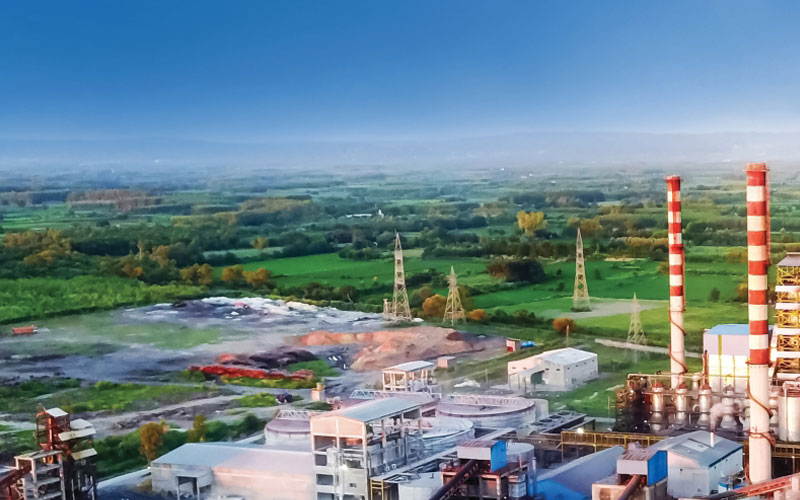
PM: We understand Kuantum is aiming for a capacity expansion and the addition of a specialty paper machine. Can you share some updates and developments about these future operations?
PK: Presently, Kuantum has four machines: PM1, PM2, PM3, and PM4. We have already started the process of increasing the capacity of all four of our machines by a cumulative 25% in the next one and a half to two years.
In the case of PM1 and PM2, the upgrades are already in an advanced stage. By July-August of 2023, their overall capacities will double taking their combined capacities to 100 TPD from the present 50 TPD. The capacity addition will primarily be towards specialty paper grades which will find application in replacement of single-use plastic and other varieties such as bond paper, colored paper, etc.
Thereafter, we have plans to upgrade both our larger machines PM3 and PM4.
Post-upgrades, our overall capacities will go up by almost 25 percent, that is figuratively, from our current levels of 1,50,000 TPA we will move up to 2,00,000 TPA in the next 2 years. In line with our vision to be more sustainable, that is “Kuantum for Earth”, we are prioritizing developing paper products for application in the replacement of single-use plastic and are therefore looking out for the rightful specialty paper machine in this regard. It is the need of the hour that we build up our capacity on specialty paper, which is the product of the future. We especially want to add an OGR paper line for ourselves and expand our product portfolio.
“Post-upgrades, our overall capacities will go up from our current levels of 1,50,000 TPA to almost 2,00,000 TPA in the next 2 years.”
PM: Please tell us more about your fibrous raw material procurement and your long-term strategy to ensure that you have a continuous supply of raw materials to support your future expansions too.
PK: At Kuantum, we use two kinds of raw materials by doing a blend of agro and wood pulp to make very high-quality writing and printing, specialty, and copier paper.
Firstly, we use wheat straw, which forms the basis of our agro-pulp. Our mill is based in Punjab, which is the hub of wheat, and about 20 million tonnes of wheat straw is produced every year, out of which the collective paper industry needs only 2 million tonnes and the rest of it goes into animal fodder. So, we do not feel that there will be any issues in the procurement of wheat straw.
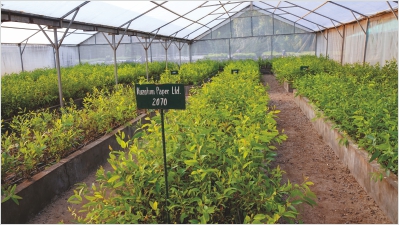
Moreover, we have been working closely with our suppliers, and owing to our business presence spanning 40 years in Punjab, we have established long-term strategic partnerships with our raw material suppliers on the agro-front. We also have robust linkages with the farmers’ community directly, whereby we provide them with a direct source of income from their small-sized landholdings, rather than through a middleman or trader. Thus, we are pursuing a two-pronged strategy of having long-term relationships with our agro suppliers and developing a very strong in-road into the local community at the grass-root level, enabling them to also earn a livelihood. This strategy will always keep us strong in procuring this raw material.
The other raw material we use is wood, wherein because of our strategic location we can procure most of our wood requirements easily within a radius of 100-200 km. We are very close to two mandis, that is Yamuna Nagar and Hoshiarpur, and try to source most of our wood from either of these. For bamboo, we rely on the neighboring Himachal Pradesh region.
In the case of wood, we are strengthening our in-house Clonal Production Center (CPC) with a vision that in the next 2-3 years we will take our clonal saplings up to 1 crore saplings per year. We provide these clones at subsidized rates to our farmer community and educate them on the benefits of intercropping and our trained team regularly monitors their plantations. This strategy supports the farmer by allowing him to generate income twice over from the same parcel of land and helps Kuantum create a sustainable source of wood raw material for the future.
We have already done a plantation on almost 5,600 acres and plan to cover about 5,000 hectares of area in the future and believe this will secure our future wood requirements.
Also Read: Naini Papers & Valmet in India Experience Smooth Cooperation on Major Fiberline Project
PM: Can you elaborate on the key strengths of your existing distribution network and how you maintain it? How does this network help you to fill the demand-supply gap?
PK: I am proud to say that we have a very strong and loyal dealer network and most of these dealers have been associated with Kuantum for over three generations. We prioritize customer centricity and aid it with faster turnaround times, the required quality and grades of paper, and by giving the rightful quantity quota to all our dealers. We treat all our dealers equally and fairly, irrespective of whether they lift small or larger quantities.
One of our key strengths is that we have a market-facing business. Hence, our supply is always steady, month on month, both in terms of quantity and quality to our network. We follow a made-to-order model and our inventory turnover time is between 3-4 days. Our order books are always full and they are enough to keep our machines running all the time. Consequently, we have not faced the issue of the demand-supply gap.
We have successfully instilled loyalty in our Pan-India dealer network, which is more than 100 dealers strong. Our highest consumption center is NCR followed by the Northeast. Nearly 40 percent of our business comes from NCR, about 25 percent from the northeast, about 10-15 percent from the west, and the balance from the south and exports. We are planning the capacity addition at our plant in Saila Khurd, and I think given the depth of our network, we will easily supply the additional stock to the market.
“Our tripartite collaboration with specialty chemical manufacturers and FMCGs is aimed at using bio-barrier technology as we intend to manufacture quality products serviceable to the food packaging industry.”
PM: How do you fulfill your ESG responsibilities? Do you have a dedicated strategy in place, if yes, please explain the same to us?
PK: ESG is a big part of our vision and future roadmap. While we have always done well with all our stakeholders, I feel that it’s time to play an even larger role in adding more value to them. At Kuantum Papers, we firmly believe that our success is intrinsically linked to our responsibility towards society and the environment. We have a strong commitment to corporate social responsibility (CSR) activities, with a focus on education, healthcare, environmental conservation, and community development. Our CSR initiatives aim to create a positive impact on people’s lives and contribute to the sustainable development of the communities where we operate.
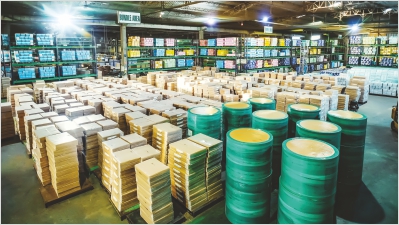
As part of our social responsibility, we operate and manage a public school with subsidized fees to promote quality education for local children. We have established dispensary facilities inside our factory premises and organize free medical check-ups and awareness camps in the surrounding villages. Additionally, we have organized distribution camps for sewing machines, benefiting widows and differently-abled women in nearby communities.
Sustainability is at the core of our business practices. We are deeply committed to minimizing our ecological footprint and preserving the environment for future generations. Our efforts include responsibly sourcing raw materials, implementing energy-efficient technologies, reducing water consumption, and promoting waste management practices. By aligning ourselves with environmental goals, we are poised to meet the evolving demands of consumers and contribute to greener world policies.
“In the case of wood, we are strengthening our in-house Clonal Production Center (CPC) with a vision of taking our saplings up to 1 crore saplings per year, in the next 2-3 years.”
PM: What is your vision and plan for Kuantum Papers’ future?
PK: My vision for Kuantum is to take our company to a level where we are competing with the best in class. We want to better our best repeatedly and to be counted amongst the most respected and sustainable paper operations in the country. We will consistently endeavor to live up to the motto of “Kuantum for Earth” by adopting green practices, clean technology and reducing our carbon footprint, and ensuring the involvement of every stakeholder associated with our operations.
“At Kuantum Papers, we are developing oil & grease resistant paper (OGR) and other specialty paper applications which could economically and quickly replace single-use plastic.”



